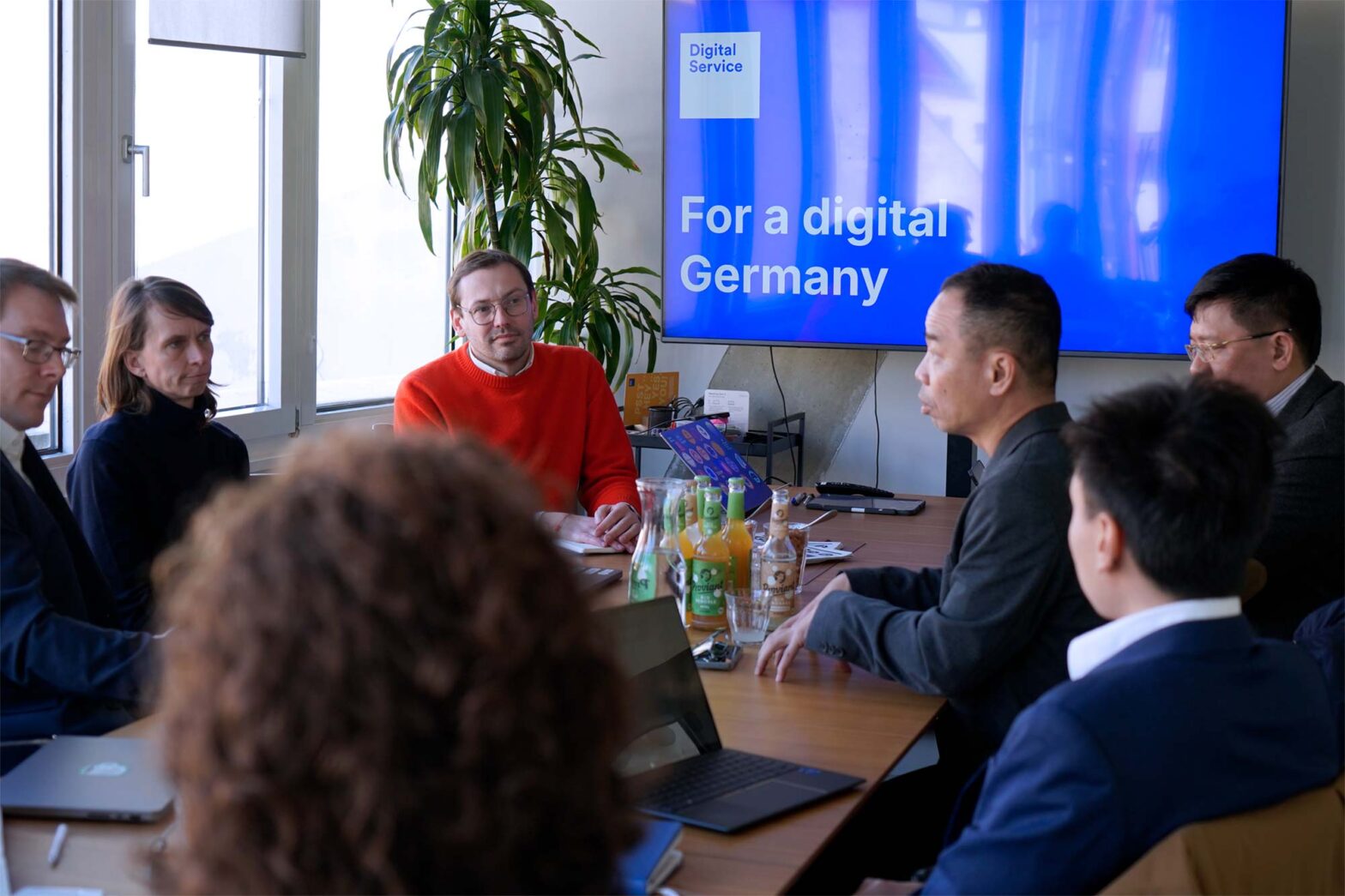International exchange is vital.
Once again, I felt privileged this week to participate in an extended exchange with colleagues from abroad who visited us and Berlin.
Meeting with GovTech colleagues
Touring through parts of Europe, Wei Boon Goh and his team stopped by for a 3-hour visit. He is the Chief Executive and Government Chief Digital Technology Officer of the Government Technology Agency of Singapore. Dominic Chan, Chief Information Officer, and 2 more engineering and engagement colleagues were with him.
CPO Stephanie, CTO Bastian, and I welcomed them to our office. Engineer Julian and strategic knowledge manager Joshua supported us.
We had a short deck prepared. We recapped how Digital Service as a unit came to be, and we talked through our ‘change through delivery’ approach. We discussed expanding our circle of control and circle of influence.
Wei Boon and Dominic had submitted several questions before. We tried to respond to them as best as possible – as much as the time allowed. In the late afternoon, I met some colleagues next to the sofa and whiteboard and went on to scribble some things not drawn before: our activities along the idealised policy cycle.
It’s the unscheduled sofa exchanges that make the difference! Preparing a deck for tomorrow’s visit of a foreign delegation, I had the urge to visualise what we do at @digitalservice.bund.de. I ended up mapping our current activities against the #policyCycle, which I had not thought of before. V1
— Martin Jordan (@martinjordan.com) March 17, 2025 at 8:07 PM
[image or embed]
I had not actively used the policy cycle diagram in the past 7 years when I co-ran some training and workshops across the UK government. But once again, it was helpful in apply commonly shared frameworks to think about one’s work.
It was unclear how familiar our GovTech colleagues were with it but they nodded along when we walked through the different work.
We all genuinely enjoyed the exchange. I learned that GovTech Singpore does much more than I thought. They have a 4,000+ work force that includes IT tech support sent into other ministries. They also do a lot of procurement. Some aspects of their work are closer to what the IT Centre of the Federal government does in Germany, other work is close to what we do.
Working properly hands-on
Lena continued conducting interviews on government domain registration. I did note-taking in these interviews.
For the Service Standard content structure, Linn and I did more sense-making, and things are slowly coming together.
I tried explaining to designer Agnieszka and engineer Dennis what Bundesstyleguide and the umbrella brand (German: Dachmarke) are good for and how they differ. They are currently working on a concept for a service area that needs some vision work. While getting closer to designs, they wanted to know which design language to build on.
In a workshop, I looked with principals Charlotte and Sonja at how we can share work among ourselves effectively. We had a good start, but there is more work to do.
I also greeted Zoé, who joined us as our first user research operations working student this week.
Lastly, I worked a bit more with Torsten on the content design skill matrix. We are making decent progress and should have a sharable version by the end of the month. But we said that last month, too.
Throughout the week, I spotted more and more ads for the Berlin government’s campaign for its online services. They promoted things like reordering birth certificates or doing address registration online. In a little Bluesky thread, I shared some observations about making promises and meeting citizen expectations. Once again, I pointed out how much ‘portal hopping’ remains a problem across levels of government in Germany.
(Typo fixed) The problem remains lacking end-to-end service ownership, and local senior digital leaders are not willing to deprecate their own portal – even though it prolongs the user’s journey with no need. They want to have their own portal – even though, it addresses no user need. 7/X
— Martin Jordan (@martinjordan.com) March 24, 2025 at 5:13 PM
[image or embed]
Doing podcast bits
On short notice, I contributed to a digital government news podcast. It’s called ‘Unbureaucratic’ and comes out monthly. It’s published by eGovernment, a printed publication for public servants. Apparently, the podcast has some 700 listeners or so.
The hosts were interested in hearing about the Service Standard update. They submitted 4 questions. I answered a few questions, and so did ministerial project partner Ralf. The hosts made the editing sound almost like us dialling into their show – even though we only shared recordings upfront.
What’s this new 🇩🇪 #ServiceStandard all about? How did we involve over 40 organisations in its definition and still manage to do it in 3 months? What’s next? 🎧 🎙️ In German, on the #Unbürokratisch eGovernment Podcast, @bmi.bund.de’s Ralf Käck and I talk about the creation of #DINSpec66336.
— Martin Jordan (@martinjordan.com) March 21, 2025 at 4:45 PM
[image or embed]
We do everything we can to increase visibility and reach the most people possible. Wherever we go, most people still haven’t heard of the now 4.5-year-old standard.
Another podcast on the Service Standard and other service design work is on my calendar for late April already.
I am still not the greatest fan of contributing to unscripted podcasts. I can get off the trail too easily. It may grow on me after doing some more.
What’s next
Next week, most of the Service Standard team will travel to Hanover to join the IT Planning Council’s annual congress.
I will also have to finish the upcoming Service Gazette. For that, I will take the Friday off – to get things done.

